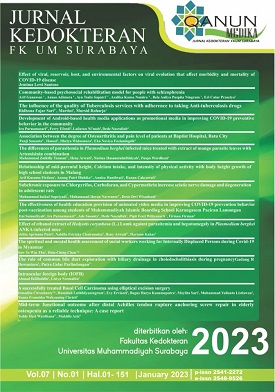Relationship of mid-parental height, Calcium intake, and intensity of physical activity with body height growth of high school students in Malang
Abstrak
Abstract
Â
Stunting is one of Indonesia's problems, as portrayed in RISKESDAS 2018. This means the growth of Indonesian children was not optimal. Some factors that might affect body height growth were genetic factors, represented by mid-parental height, nutritional factors, especially calcium, and physical activity, which could activate pathways to stimulate growth. These factors were known to have a huge role in body height growth, especially if these factors were optimized in adolescence, as in high school students. This research aimed to explain the relationship between body height growth and the factors that might affect it: mid-parental height, calcium intake, and the intensity of physical activity. This research was observational analytic, using purposive sampling as the sampling method and collecting data using a cross-sectional questionnaire. Statistical analysis between variables shows that mid-parental height was positively related (p<0.05, r: 0,356), while calcium supplementation was not associated (p<0.05, r: -0.165), and intensity of physical activity was not related (p=0.059, r: 0.089) with the body height growth of the students. In conclusion, among the factors that were analyzed, mid-parental height was the only one that had a relationship with body height growth.Artikel teks lengkap
Referensi
Bajer, B., Vlcek, M., Galusova, A., Imrich, R., & Penesova, A. (2015). Exercise associated hormonal signals as powerful determinants of an effective fat mass loss. Endocrine Regulations, 49(3), 151–163. https://doi.org/10.4149/endo_2015_03_151
Garza, C., Borghi, E., Onyango, A. W., & De Onis, M. (2013). Parental height and child growth from birth to 2 years in the WHO multicentre growth reference study. Maternal and Child Nutrition, 9(S2), 58–68. https://doi.org/10.1111/mcn.12085
Gat-Yablonski, G., & Phillip, M. (2015). Nutritionally-induced catch-up growth. Nutrients, 7(1), 517–551. https://doi.org/10.3390/nu7010517
Goyal, A., Jyotsna, V. P., Singh, A. K. C., Gupta, Y., & Khadgawat, R. (2020). Etiology and Clinical Profile of Patients with Tall Stature: A Single-Center Experience. Indian Journal of Endocrinology and Metabolism, 24(5). https://journals.lww.com/indjem/Fulltext/2020/24050/Etiology_and_Clinical_Profile_of_Patients_with.10.aspx
Guasto, A., & Cormier-Daire, V. (2021). Signaling Pathways in Bone Development and Their Related Skeletal Dysplasia. In International Journal of Molecular Sciences (Vol. 22, Issue 9). https://doi.org/10.3390/ijms22094321
Guyton, A. C., & Hall, J. E. (2019). Guyton Dan Hall: Buku Ajar Fisiologi Kedokteran.
IDAI. (2017). Panduan Praktik Klinis Ikatan Dokter Anak Indonesia: Perawakan Pendek pada Anak dan Remaja di Indonesia. Ikatan Dokter Anak Indonesia, 1–4.
Jazbinšek, S., & Kotnik, P. (2020). Influence of physical activity on linear growth in children and adolescents. Annales Kinesiologiae, 29–42. https://doi.org/10.35469/ak.2020.222
Kohl, H. W., Cook, H. D., Van Dusen, D. P., Kelder, S. H., Kohl, H. W., Ranjit, N., & Perry, C. L. (2013). Educating the study body: taking physical activity and physical education to school. Chapter 4: Physical Activity, Fitness, and Physical Education: Effects on Academic Performance. In Journal of School Health (Vol. 81, Issue 12).
Kowal, M., Sorokowski, P., Żelaźniewicz, A., Nowak, J., Orzechowski, S., Żurek, A., & Żurek, G. (2021). A positive relationship between body height and the testosterone response to physical exercise. Evolution and Human Behavior, 42(3), 179–185. https://doi.org/https://doi.org/10.1016/j.evolhumbehav.2020.08.012
Kristianto, J., Johnson, M. G., Afzal, R., & Blank, R. D. (2017). Endothelin Signaling in Bone. Endocrinology and Metabolism Clinics of North America, 46(1), 51–62. https://doi.org/10.1016/j.ecl.2016.09.014
Lango Allen, H., Estrada, K., Lettre, G., Berndt, S. I., Weedon, M. N., Rivadeneira, F., Willer, C. J., Jackson, A. U., Vedantam, S., Raychaudhuri, S., Ferreira, T., Wood, A. R., Weyant, R. J., Segrè, A. V, Speliotes, E. K., Wheeler, E., Soranzo, N., Park, J.-H., Yang, J., … Hirschhorn, J. N. (2010). Hundreds of variants clustered in genomic loci and biological pathways affect human height. Nature, 467(7317), 832–838. https://doi.org/10.1038/nature09410
Maharsari, D. R. (2018). HUBUNGAN ASUPAN KALSIUM DENGAN TINGGI BADAN REMAJA SMP MUHAMMADIYAH 2 SURAKARTA.
Riskesdas Jatim. (2018). Laporan Provinsi Jawa Timur RISKESDAS 2018. In Kementerian Kesehatan RI. https://drive.google.com/drive/folders/1XYHFQuKucZIwmCADX5ff1aDhfJgqzI-l%0A
Savitri, A., Zulhamidah, Y., & Widayanti, E. (2021). Hubungan Aktivitas Fisik terhadap Tinggi Badan pada Mahasiswa Fakultas Kedokteran Umum Universitas YARSI yang Berumur Kurang dari atau Sama dengan 20 Tahun. Majalah Kesehatan Pharmamedika, 12. https://doi.org/10.33476/mkp.v12i1.1603
Sherwood, L. (2016). Human physiology : from cells to systems / by Lauralee Sherwood (9th ed.).
Shkembi, B., & Huppertz, T. (2022). Calcium Absorption from Food Products: Food Matrix Effects. In Nutrients (Vol. 14, Issue 1). https://doi.org/10.3390/nu14010180
Winzenberg, T., Shaw, K., Fryer, J., & Jones, G. (2007). Calcium Supplements in Healthy Children Do Not Affect Weight Gain, Height, or Body Composition. Obesity, 15(7), 1789–1798. https://doi.org/https://doi.org/10.1038/oby.2007.213
Xu, B., Feng, Y., Gan, L., Zhang, Y., Jiang, W., Feng, J., & Yu, L. (2021). Vitamin D Status in Children With Short Stature: Accurate Determination of Serum Vitamin D Components Using High-Performance Liquid Chromatography-Tandem Mass Spectrometry. Frontiers in Endocrinology, 12, 707283. https://doi.org/10.3389/fendo.2021.707283
Yang, J., Andre, P., Ye, L., & Yang, Y.-Z. (2015). The Hedgehog signalling pathway in bone formation. International Journal of Oral Science, 7(2), 73–79. https://doi.org/10.1038/ijos.2015.14
Penulis

Qanun Medika oleh FK UM Surabaya disebarluaskan di bawah Lisensi Creative Commons Atribusi 4.0 Internasional.
Berdasarkan ciptaan pada http://journal.um-surabaya.ac.id/index.php/qanunmedika.

